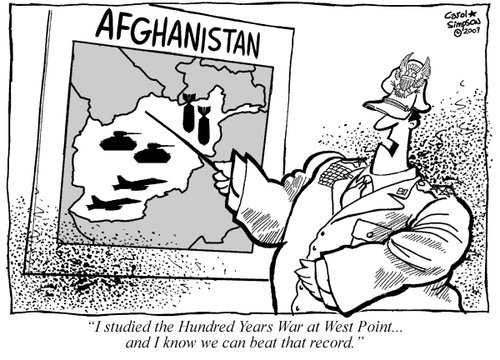There’s a joke I tell people sometimes about my cigarette-smoking habit: “Worse dumb-ass thing I’ve ever done — next to being married twice.”

(Illustration found here).
Afghanistan has never, ever been any kind of a joke, unless it’s one of those extreme-black swipes at humor.
In a report from the BBC, the US Pentagon says Afghan war violence is at an all-time high (a claim that continues from one report to another) and “Efforts to reduce insurgent capacity, such as safe havens and logistic support originating in Pakistan and Iran, have not produced measurable results.”
And this comment from antiwar.com‘s Jason Ditz: The report’s claims of progress are largely in keeping with comments from other Pentagon officials, but it is comparatively rare for those officials to admit just how badly the violence in Afghanistan is getting, even as 2010′s death toll spirals far beyond the previous record toll in 2009.
Plus no real end in sight.
This coming Saturday, the US will literally shoot past the old USSR’s nasty stay in Afghanistan — the Soviets put 600,000 of its troops in country for nearly a decade and got their asses whipped so bad the conflict is dubbed the old communist regime’s ‘Vietnam,’ leading to collapse of the empire.
Aljazeera English has an excellent special report on the doomed Soviet enterprise here with a dramatic video.
Robert Wright has much-readable piece up this morning in the New York Times on the subject of Afghanistan placed in the horrible glare of Vietnam and the major difference between the two.
Vietnam didn’t really have a global effect on the US — although the tragedy was terrible on this country, the after-effects didn’t really carry on into the future.
The money bits from Wright’s post:
Is Afghanistan, as some people say, America’s second Vietnam? Actually, a point-by-point comparison of the two wars suggests that it’s worse than that.
For starters, though Vietnam was hugely destructive in human terms, strategically it was just a medium-sized blunder. It was a waste of resources, yes, but the war didn’t make America more vulnerable to enemy attack.
The Afghanistan war does. Just as Al Qaeda planned, it empowers the narrative of terrorist recruiters — that America is at war with Islam. The would-be Times Square bomber said he was working to avenge the killing of Muslims in Afghanistan and Pakistan. And Major Nidal Hasan, who at Fort Hood perpetrated the biggest post-9/11 terrorist attack on American soil, was enraged by the Afghanistan and Iraq wars.
…
Both the Vietnam and Afghanistan wars were fought in the name of a good cause. There was indeed a hostile force that had to be kept at bay — communism and terrorism, respectively. And in each case the mistake was overestimating the intrinsic power of that force.
…
Of course, wastefulness is a pretty bad thing in its own right. Spending on Vietnam helped fuel inflation that was eventually subdued only with a stiff monetary policy that brought much unemployment. And the cost of the Afghanistan war already exceeds the cost of the Vietnam and Korean Wars combined, even in inflation-adjusted dollars. At $100 billion a year (seven times the gross domestic product of Afghanistan) this war is feeding a deficit that will eventually take its toll in real, human terms. I encourage Tea Partiers and other fiscal conservatives to ponder the tension between deficit hawkism and military hawkism.All told, then: in terms of the long-run impact on America’s economic and physical security, the Afghanistan war is as bad as the Vietnam War except for the ways in which it’s worse.
Read the whole piece and follow the links it provides for some most-excellent information on how screwed the US in that vast ‘graveyard of empires.’
And it ain’t no joke.